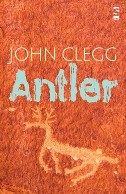reviewed by Judi Sutherland
Hiking north with an archeologist of myth.
There’s a primaeval atmosphere in John Clegg’s new collection, Antler. His poems inhabit a land of bark canoes, whalebone, orchards and moss. It’s definitely northern, even Arctic, and speaks of people living a precarious existence on the edge of history and myth. But those people are also recognisably us, and there are telescopes, escalators and skidoos between these pages.
Clegg’s rhymes are subtly crafted but their consistent style throughout the collection extends the feeling that we are in a self-contained world.
The first half of the collection is entitled Leather, and here it is the ancient world that is predominant. The opening poem, which provides the collection’s title, takes us straight into Clegg’s mythology: ‘This was the empire of antler, / walrus ivory, soapstone and marten furs’. Natural objects become totemic; there’s something not quite ordinary about ‘Moss’ – it seems like a prehistoric analogy for money, something which the people cultivate obsessively while ‘Our holy valley stayed unoccupied’. The moss speaks of our deep-set material cravings and their tendency to take us over. There’s a strong element of the trickster in ‘Piltdown’ which describes how someone who has been defrauded over the fake ‘missing link’ then becomes a fraudster himself.
The language of the poems heightens the mystical atmosphere. In ‘Spell for an Orchard’ the word ‘orchard’ is repeated so many times as a perfect rhyme that it loses its common meaning and becomes an incantation. The orchard itself is a place where beliefs begin, it is a prototypic universe. In ‘Nightgrass’, the ‘daygrass’ – cereal crops that allowed the hunter-gatherers to settle down – is clearly delineated, but the nightgrass of the title is harder to harvest: it is ‘waiting outside folklore’, it’s a weed, a malevolent presence, another Crow-like trickster. Even in ‘Ramon Sije’, a poem based on the elegiac poem of the same name by Spanish poet Miguel Hernandez, the mood and the vocabulary are maintained. The narrator rails against God, ‘that witty gent / upstairs’, for the death of his friend, threatening:
I’ll eat his planet bite by bite I’ll flense the mantle from the core I’ll thresh the trees like they were wheat If you don’t speak.
Clegg’s rhymes are subtly crafted but their consistent style throughout the collection extends the feeling that we are in a self-contained world. In ‘A Dead Racehorse’ the stanzas are cleverly tied together with the sound of ‘metal’, ‘bridle’, ‘kettle’, ‘middle’, ‘muscle’ and ‘fossil’. Perfect rhymes appear again in ‘The Whole Hog’ where they create an impression of inevitability in the story of the hog ‘spit-roasted for writing sestinas’.
Lace is the second half of the book. Here the vibe is more contemporary, but the mythology equally pervasive. In ‘Purgatorio’, a truck driver in a northern wasteland recites urban myths:
I’ve heard truckstop stories of this route - the UFO, the hitcher beardless, weeks from anywhere –
There’s a very funny account of ‘Learning German’ where the gender of ‘knife’, ‘fork’ and ‘spoon’ is explored. Clegg enjoys the confluence of the words’ sounds and their meanings, and creates stories to make sense of it. An extended poem about the Finnish astronomer Yrjo Vaisala and his mysterious post-doctoral assistant, Sinuhe, who exerts her own magical influence, ends with an arch reference to the X-Files which brings us stumbling back into the present day.
The success of Antler lies in exactly this coalescence of ancient and modern, where a calving glacier is ‘handing out / blank business cards’; where the mythical ‘King of Herring’ can be seen on ‘sonar’s phantom-sweep’ and a ‘shuttered coffee-shop / forgets to leave crop circles on the table’. In Clegg’s world the old things have not passed away, the mythology, symbolism and superstition of our ancestors is visibly with us and is thriving. Clegg extends the line of poets who identify as shaman – there’s a distinct debt to Hughes and Eliot in the weaving of modern exigencies with deep, non-rational human impulses. He’s conducting a psycho-archaeology that tells us something fundamental about our ‘primitive’ nature which civilisation can’t subsume. It’s a complex and closely-woven collection which will bear frequent re-reading.










